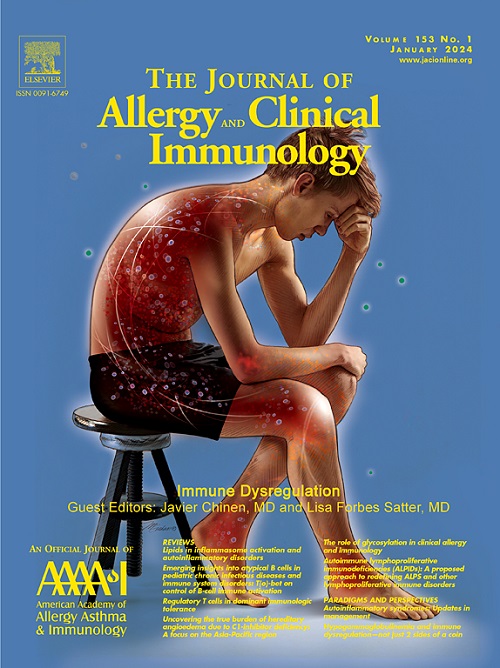Current data on biologics: Evaluating clinical remission in asthma
IF 11.2
1区 医学
Q1 ALLERGY
引用次数: 0
Abstract
The growing interest in clinical remission in asthma is due in large measure to the observation that many patients with severe asthma demonstrate substantial and durable improvements while receiving biologic therapy. Rates of clinical asthma remission in patients treated with a biologic have ranged from 19% to 43% in retrospective real-world studies and 13% to 35% in post hoc analyses of randomized controlled studies of biologics. Although these studies applied different remission criteria, almost all used a 4-component remission definition consisting of exacerbations, oral corticosteroid receipt, symptom control, and lung function parameters. Available evidence suggests that patients with a type 2 inflammatory endotype with less severe disease, shorter disease duration, and fewer comorbidities are more likely to experience remission. Little is currently known about asthma clinical remission in children and adolescents treated with a biologic. Prospective studies in patients of all ages are needed to refine the definition of clinical asthma remission and identify interventions and patient characteristics associated with remission.
This article is part of a supplement supported by an educational grant from AstraZeneca Pharmaceuticals. The content of this article was developed independently by National Jewish Health and the article authors.
生物制剂的最新数据:评估哮喘的临床缓解
人们对哮喘临床缓解的兴趣越来越大,这在很大程度上是由于观察到许多严重哮喘患者在接受生物治疗时表现出实质性和持久的改善。在现实世界的回顾性研究中,接受生物制剂治疗的患者的临床哮喘缓解率为19%至43%,在生物制剂随机对照研究的事后分析中为13%至35%。尽管这些研究采用了不同的缓解标准,但几乎所有的研究都采用了由病情加重、口服皮质类固醇、症状控制和肺功能参数组成的缓解定义。现有证据表明,2型炎症内型患者病情较轻,病程较短,合并症较少,更有可能获得缓解。目前对使用生物制剂治疗儿童和青少年哮喘的临床缓解知之甚少。需要对所有年龄段的患者进行前瞻性研究,以完善临床哮喘缓解的定义,并确定与缓解相关的干预措施和患者特征。本文是由阿斯利康制药公司教育资助的增刊的一部分。这篇文章的内容是由国家犹太人健康和文章作者独立开发的。
本文章由计算机程序翻译,如有差异,请以英文原文为准。
求助全文
约1分钟内获得全文
求助全文
来源期刊
CiteScore
25.90
自引率
7.70%
发文量
1302
审稿时长
38 days
期刊介绍:
The Journal of Allergy and Clinical Immunology is a prestigious publication that features groundbreaking research in the fields of Allergy, Asthma, and Immunology. This influential journal publishes high-impact research papers that explore various topics, including asthma, food allergy, allergic rhinitis, atopic dermatitis, primary immune deficiencies, occupational and environmental allergy, and other allergic and immunologic diseases. The articles not only report on clinical trials and mechanistic studies but also provide insights into novel therapies, underlying mechanisms, and important discoveries that contribute to our understanding of these diseases. By sharing this valuable information, the journal aims to enhance the diagnosis and management of patients in the future.

 求助内容:
求助内容: 应助结果提醒方式:
应助结果提醒方式:


